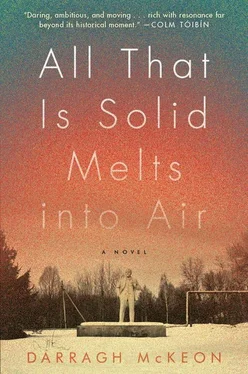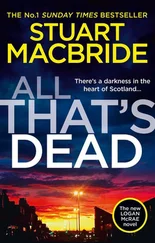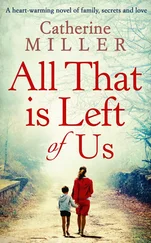“For your information, there has been a fire reported in Reactor 4 of the Ukrainian nuclear-power plant, Chernobyl. The incident is under control but we have reports that the damage may be significant. However, I can reassure you that this incident will not stop the advance of nuclear energy.”
The last line is startling: it sits far outside the usual linguistic format of official communiqués. They are defending nuclear energy, as if anyone had questioned it, as if they were in the midst of a debate. Statements always come as unambiguous information. The Politburo communicates with orders or blank generalities. Grigory looks across the table at Vasily and can see he’s sharing the same thought. They’re saying it to reassure themselves. Something catastrophic must have occurred.
They all gather their papers and leave the meeting. Outside, amongst the department heads, there is some speculation as to what it might mean for them. This generalized discussion always happens afterwards, rival departments picking through the gossip, looking for ways to gain an advantage in their allocation of resources, awaiting talk of any unofficial developments.
Vasily and Grigory stand in the group and listen and offer a few opinions and then walk to a quiet corridor to talk freely. They decide to break with protocol and pay a visit to the administrative secretary. Ordinarily this would be perceived as an affront to Zhykhov, a subtle accusation that he didn’t thoroughly cover an important issue in the meeting. But the news has just come in, and they could merely inquire as to any further developments.
When they push the door open, Slyunkov is sitting upright at his desk, typing. He is reluctant to give any information, but they both stand there in silence until Slyunkov can no longer bear the tension and informs them of the only extra details that he knows: that a state of emergency has been announced in the region; they’ve declared the disaster at 1–2–3–4, the same level as an all-out nuclear strike. The doctors are visibly shocked. They ask to speak to Zhykhov, to make any preparations that might be necessary, but are told that he is already on his way to the Kremlin; all the committee chairmen from the surrounding hospitals have been called for an emergency meeting.
There is nothing left for them to do but go home. It’s not expected that they will be needed, but they’ll be contacted if necessary.
Grigory drives Vasily to his apartment. They’re mostly silent for the trip, it’s too early to draw any conclusions. People are going about their weekends. They’re almost all carrying something, preparing for something. Kids holding footballs, older women dragging shopping trolleys with leeks or carrots peeking out from the side panels. Grigory pulls up outside the block, his brakes letting out a moan. He’s been meaning to have them looked at.
“You’re sure you won’t come in for some lunch?”
“Yes. But thanks. I want to go and get my hands dirty.”
“Margarita will take it as a slight on her cooking.”
“I’ve put away enough of her food to prove my devotion. But thank you. I just want to get some fresh air.”
“I know how you feel. Why not stop in for a drink on your way back?”
“Thanks, I’ll think about it.”
In the allotment it begins to rain as he’s kneeling, scooping the soil. The day is damp and sullen and he looks up and feels the drops break on his face and watches them transform the skin of the soil, black freckles appearing all around. He stands in the small wooden shed where he keeps his tools and listens to the staccato patter. There are a few families near the southern end of his section, and he can hear parents ordering their kids to shelter, some muffled screeches punctuated by their yelping dog.
He would like the chaos that children bring. He’d like crayon marks on his walls, stains on his rugs that are so ingrained that they’re mistaken for part of the pattern. He’d like a child to push against him, force him to rethink what he knows, reshape his personality, something that other adults had long since stopped doing. He watches Vasily with his own kids sometimes, watches the way they casually hold his hand, sitting over lunch, the child like a smitten teenager. His meeting with Maria has stirred up layers of settled sediment, but he doesn’t want to think about it too much. He’s reluctant to have expectations.
Grigory usually brings a flask of tea. Now would be the time to drink it. But he’s forgotten it, too busy thinking about this morning’s news. Puddles form in the walkways between the plots. He’d like to indulge in the sheer pleasure of kicking into puddles, another reason to bring a child here; there are many things a grown adult needs permission to do.
The rain keeps coming. He should go, but he’ll work on.
He returns to kneeling, progressing slowly along the rows, oblivious to the rest of the world. He becomes soaked, but he doesn’t notice this until he hears his name being called and watches Vasily striding towards him from the road and he wipes his hand on his sweater, which now hangs heavy, filled with wet.
Grigory stands. It can only be something serious.
Vasily shouts to him before he comes within speaking range, clambering over a chicken-wire fence.
“Zhykhov called, looking for you.”
“I would have thought he has more important things to worry about.”
“Not really. We’re pretty important right now.”
“What do you mean?”
“There’s a committee flight leaving Zhukovsky Airfield at five thirty. We’re to be on it.”
“To go to the Ukraine? To… what is it called?”
“Chernobyl. Yes.”
Vasily reaches him now, talking at normal volume, panting slightly.
“But that’s idiocy. What do we know about emergency medicine?”
“An endocrinologist and a cardiothoracic surgeon, it’s not a bad place to start.”
“I mean, they surely have a team of experts for these situations.”
“For what situations, Grigory? When does something like this ever happen?”
“But surely they have plans in place.”
“Well, it looks like we’re part of them.”
They both take this in.
“You have children, you can get out of it. I’m sure there’s someone you can plead to.”
“It’s a full-scale disaster. If I don’t go I couldn’t even apply for a box of pencils. My kids need to move schools next year, and Margarita’s parents will retire in a few months. I can’t turn this down. And, anyway, I’d prefer to be involved than to leave it to some backslapping academic. At least we can be useful.”
“You hope.”
“Of course we can. We’ll make sure whatever needs to be done is done.”
Grigory picks a sprouting tuber from the ground, shifting it from hand to hand.
“What else did they say?”
“That’s it. They’ll send a car for us at five. They’ll give us the details at the airfield.”
Grigory throws the tuber into the next plot and gently sidefoots one of the ridges he’s created, watching the soil collapse upon itself. So much for the work he’s put in.
“Tell Margarita to come down here in a month or so. There’ll be a plot of new potatoes waiting for her.”
“I will.”
In his bedroom, Grigory stuffs shirts into a sleek brown suitcase. An expensive purchase from two years ago, although apart from a couple of weekend conferences it has lain unused under his bed. He has no idea what to pack. What should one wear to a reactor meltdown? Socks lie scattered at random in his drawer and he selects several, balling them into pairs before firing them into the case.
A thought causes him to pause. A nuclear disaster. He could die in such a place.
Grigory looks at the striped socks in his drawer. He’s walking into a poisonous lair and is packing shirts and socks. He sits on the bed and stares into the possibilities.
Читать дальше












